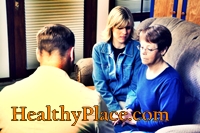BPD and Spirituality: Hazardous But Healing River (pt. 2)
I'll never forget when I was first diagnosed with borderline personality disorder (BPD). My mother had hand-picked a psychiatrist for me to see based on the doctor's Christian faith. The psychiatrist did an evaluation, diagnosed me with some other things and BPD, then told my mother it was caused by bad parenting.
So began not only my journey in the world of mental illness, but my family's as well.
How a Minister Can Help With Mental Illness
 How can ministers help people with mental illness? In Howard J. Clinebel’s The Mental Health Ministry of the Local Church (featured at http://www.religion-online.org), Clinebel writes “The clergyman has a responsibility to both the mentally ill person and his family.” Last week, I wrote about how ministers can help people with mental illness. This week, I'm writing about how ministers can help the family of someone with mental illness.
How can ministers help people with mental illness? In Howard J. Clinebel’s The Mental Health Ministry of the Local Church (featured at http://www.religion-online.org), Clinebel writes “The clergyman has a responsibility to both the mentally ill person and his family.” Last week, I wrote about how ministers can help people with mental illness. This week, I'm writing about how ministers can help the family of someone with mental illness.
Clinebel writes “The minister has a major opportunity in helping the patient’s family. Often they are living under a dark, miasmic cloud of fear, humiliation, and guilt. … Except for a minimum of help from the social work department of a mental hospital or clinic, the family is left to handle the trauma largely on its own. The pastor’s opportunity to stand with the family in their lonely, confused distress is one of the privileges of being a clergyman.” He identifies the clergyman’s responsibilities to the family as:
- Helping them accept the fact that their loved one is mentally ill. Clinebel writes “Family members sometimes deny that their loved one is really mentally ill, holding on desperately to the hope that the person will ‘snap out of it’ or that ‘all he needs is a good rest.’ Their own feelings of distress, social stigma, fear, and guilt may be too strong for them to take appropriate steps without firm support and guidance by a trusted clergyman.
- Assist them in getting the person psychiatric help
- Supporting them to help them understand and learn through the crisis. Clinebel writes “This involves helping them work through their painful feelings about the ‘stigma’ of mental illness and their feelings of guilt and rejection toward the ill person.”
- Helping them relate positively and prepare for the person’s return in cases of hospitalization
- Counseling the family in cases requiring permanent custodial care
- Keeping in close contact during post-treatment adjustment
- Mobilizing a caring ministry among the congregation
Why a Family Needs Help
Teresa Hatten of the National Alliance on Mental Illness Fort Wayne chapter states,
“Mental health care for children with emotional, behavioral and mental disorders is often fragmented or not available at all. NAMI’s 1999 landmark report, Families on the Brink, stated ‘The overall picture is one of major barriers to care, with devastating results for the children and the families. Fifty-five percent of the families of children with serious mental illness surveyed reported that they had to change jobs or quit to take care of their ailing offspring; fifty-nine percent said they felt like they were pushed to the breaking point; and nearly one-fourth of the families were forced to give up their children to the states in order to get much needed treatments and services.’”
It gets worse when the child becomes an adult, for then families have no right to care for the patient and no right to know anything about the patient's case. When President George W. Bush commissioned the New Freedom Initiative, the report stated that the mental health delivery system is “fragmented and in disarray.” This fragmentation includes gaps in care for children, gaps in care for adults with serious mental illness, high unemployment and disability for people with serious mental illness, lack of care for the elderly with mental illness, and lack of national priority for suicide prevention and mental health treatment.
Clearly the family will need help navigating the system alongside their loved one. A minister is an ideal companion in this emotional journey. But the question remains: How do we start?
We can start by teaching families it's not always their fault. We can start by letting families talk freely and openly about the struggle. We can start by loving and accepting them and their loved one. We can start anywhere.
But start we must. Families are depending on it.
APA Reference
Oberg, B.
(2013, February 12). BPD and Spirituality: Hazardous But Healing River (pt. 2), HealthyPlace. Retrieved
on 2026, March 5 from https://www.healthyplace.com/blogs/borderline/2013/02/bpd-and-spirituality-hazardous-but-healing-river-pt-2